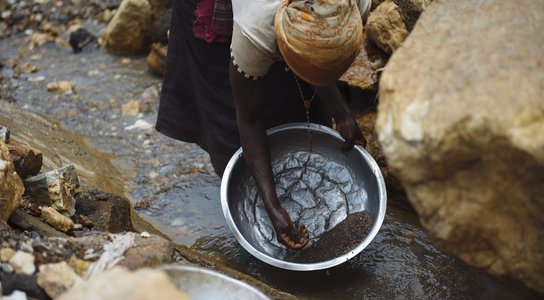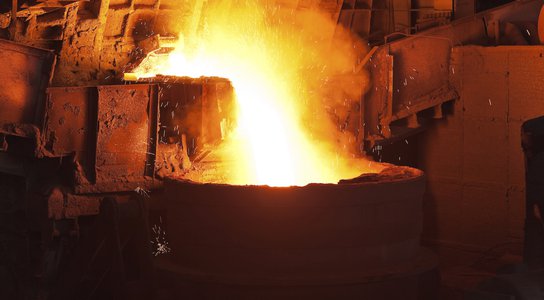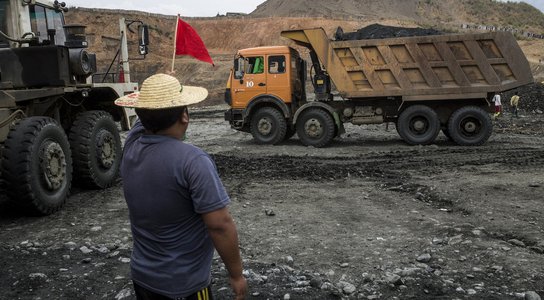This blog was originally published on the Business & Human Rights Resource Centre website here.
The London Metals Exchange (LME) – the world’s biggest market for industrial metals – just closed a public consultation on its first responsible sourcing standards. These aim to ensure that physical metals traded on the LME platform do not fund corruption, human rights abuse or conflict.
Today’s metal markets value price and quality, but they overlook the impacts of mineral production and trade on people and the planet. The 2008 financial crash was the product of a system that incentivised wild speculation on assets. We risk a parallel crash, this time linked to our natural resources, unless we reform the way in which they are mined, manufactured and traded.
The LME should rewrite the rule book and help reform how metal supply chains function - and other global exchanges should follow suit.
Supply chains ripe for reinvention
Every day thousands of tonnes and millions of dollars’ worth of natural resources are traded across physical metal exchange platforms like the LME. Commodity exchanges in China, London, New York and other global capitals facilitate the daily sale and transfer of materials that underpin the world economy and our daily lives.
Right now trading companies and merchants that buy, sell and speculate on raw materials are not required to conduct supply chain checks, a process known as due diligence. They should be obligated to do so. These risk-based checks ensure companies take responsibility for the impact of their business and help disrupt links between metals and climate change, corruption and conflict.
Metal supply chains are ripe for reinvention. Most are opaque. Few benefit those doing the digging as much as those doing the trading. Middle-men can blur lines throughout supply networks, making it harder to know through which hands metals have passed and in what circumstances. Refiner-to-refiner trades can conceal high-risk transactions. Free trade zones can allow metals to move around in ways that are difficult to track.
Relatively few people know what international commodity traders are or how they provide the goods we use. All of which makes it easier for commodity trading companies to avoid scrutiny.
Time for a system change – will the LME lead the way?
If done well, the LME’s proposed rules are an opportunity to open up and transform this system. The Exchange’s current proposals suggest producers or brands that fail to check their metals’ supply chains could ultimately be removed from the Exchange - what the LME calls “brand action”.
But the proposal does not go far enough, as Global Witness and 16 international NGOs outlined in an open letter in June.
Most significantly, the LME must require brands to report on environmental or climate-related risk – a provision not included in the current draft. Climate change and society’s response to it represents a financial risk to companies, including those trading on exchanges. International studies suggest that companies with strong ESG policies outperform those which do not take these risks into account. The US Business Roundtable has asked its members to put environmental impact over shareholder primacy.
Public responses to the LME’s responsible sourcing consultation suggest that metal traders would rather ignore climate risks than tackle them. One warns that “should such requirements preclude the use of coal-produced products [from trade on the LME], an estimated 67% of world production of aluminium would be excluded from trading on the LME”.
These comments should make climate reporting more, not less, of a priority.
The LME must also ensure that its listed brands go beyond a comply and conform mind-set. Too much rests on binary certifications and industry accreditation. Today’s metals markets actors often prefer to cover up and close ranks, using audited and certified supply chains which hide the reality of what lie beneath. It is time we speak honestly about how metal supply chains really work.
Asking brands to address supply chain risks by joining an industry scheme, as outlined in the current LME proposal, will not adequately reform supply chain behaviour in reality. A recent analysis by IPIS, a Belgian NGO, of a scheme in eastern DRC suggests that abuses continue in mines and mining zones covered by responsible sourcing programmes. Forthcoming Global Witness analysis of publicly available due diligence reporting by over seventy China-based smelters and refiners - all members of internationally recognised industry schemes - reveals disappointing results.
Responsible trade should be the new normal
Commodity exchanges have the responsibility and power to ensure that they facilitate responsible trade. The LME has shown leadership but must go further. The Intercontinental Exchange (ICE) and CME Group exchanges in trading centres New York, Paris, and Chicago and the Shanghai Gold Exchange and Shanghai Metals Exchanges should follow the LME’s example. At a minimum they should ensure their own members and brands meet international standards, particularly those set by the OECD on responsible mineral supply chains.
Minerals and metals should not be produced and traded at the expense of people and our environment. A low-carbon future and truly responsible mineral trading relies on systems change. Commodity exchanges and the trade they facilitate are a crucial part of that.


